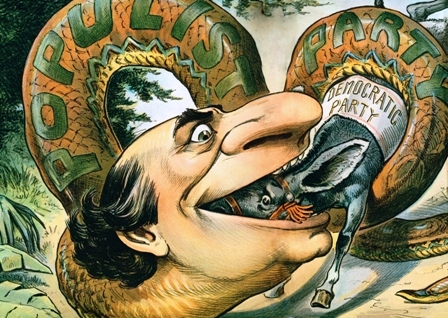
Populism has made tremendous gains in Western democracies
Can we compare any of these states to Western democracies? Not really. These are hybrid regimes, neither fully autocratic nor democratic, without deep-rooted democratic cultures or practices.
But in Western European democracies, populist parties now compete at the ballot box. Consider Albert Rösti’s Swiss People’s Party (SVP), Geert Wilder’s Party for Freedom in the Netherlands, Heinz-Christian Strache’s Austrian Freedom Party (FPÖ), Matteo Salvini’s Lega Nord in Italy, Jimmie Akesson’s Swedish Democrats, Timo Soini’s True Finns, Marine Le Pen’s Front National (FN), Tom Van Grieken’s Flemish Vlaams Belang, Nigel Farage’s U.K. Independence Party, and Kristian Thulesen Dahl’s Danish People’s Party (DF), among many others. Europe has also seen growing support for several populist-progressive parties as well, including Spain’s Podemos, Greece’s Syriza, and Italy’s Five Star Movement.
Across Europe, the average share of the vote for populist parties in national and European parliamentary elections has more than doubled since the 1960s, from around 5 percent to around 13 percent, according to my estimates, as you can see in the figure below. During the same era, their share of seats has tripled, from 3.8 percent to 12.8 percent.
But has support for populists peaked — or is it still rising? Let’s consider the results of recent European elections and polling about upcoming elections to answer that question.
In three recent European elections — in Austria, the Netherlands and France — populists gained more electoral support than they had in earlier equivalent contests, even though they failed to break through into office. The populist agenda and rhetoric have been absorbed by center-right parties, such as the British Conservatives and the Dutch People’s Party for Freedom and Democracy.
And in France, while Marine Le Pen didn’t win, her populist FN party won a larger proportion of the presidential vote than ever before, pulling in 34 percent in the final runoff — almost double the share of the vote that her father won in the equivalent contest just 15 years ago, in 2002.
Across the Channel, in the run-up to Britain’s June snap election, UKIP’s vote share is down to 7 percent in the current polls, compared with 12.6 percent of the vote it won in the 2015 general election. Polls suggest that its supporters have switched to Theresa May’s Conservative Party, which has embraced Brexit wholeheartedly. But that doesn’t mean populism is dead in Britain; rather, its anti-European policies and aggressive nationalist rhetoric have been absorbed by the Conservatives.

In Germany, where the nation will vote for the Bundestag on Sept. 24, we can’t yet assess whether the Alternative for Germany (AfD), founded in 2013, can win more than 5 percent of the national vote, the minimum required to gain seats. Doing so would confer a legitimacy that could improve its prospects in future contests. But AfD now has representatives in 10 of the 16 German states, and its support in current opinion polls is roughly twice what it won in the 2013 election — suggesting a slow but steady increase in popularity.
And that’s been the theme in recent European — and U.S. — elections. Slowly but steadily, populism has been gaining electorally, being absorbed by mainstream parties, reshaping the policy agenda, and shifting the political and cultural divide, pitting populist nationalists against cosmopolitan liberals.
While the precise trajectory is different in each country, the trend is clear. Triggered by globalism’s economic and migratory earthquakes, and by a backlash against progressive culture shifts, populism has infected center-right parties and decimated the social democratic center-left — and it is likely to continue to gain ground, even if experiencing occasional electoral setbacks and defeats, until the underlying conditions change.
Pippa Norris is the McGuire Lecturer in Comparative Politics at Harvard University, the ARC Laureate Professor of Government and International Relations at the University of Sydney, and founding director of the Electoral Integrity Project. She is the author of more than 40 books, including the forthcoming Strengthening Electoral Integrity (Cambridge University Press, 2017).


